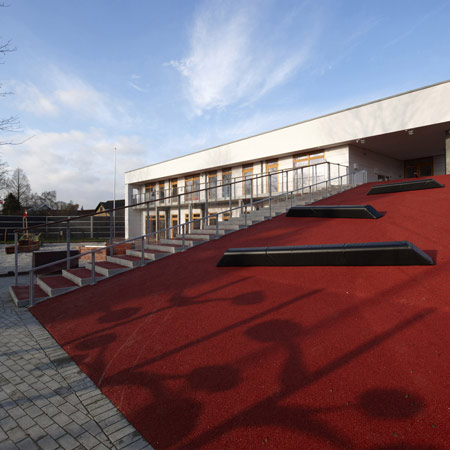Danish architects CF Møller have completed a kindergarten in Odense, Denmark, where children can clamber around the building over large ramps and apertures in interior walls.
Called Dragen Children's House, the project is arranged on two levels and incorporates small spaces or niches, in which children can play, read or hide away.
The kindergarten will accommodate 88 children.
Here's some text from the architects:
--
‘Dragen’ Children’s House
The integrated kindergarten 'Dragen' sets new standards, as a sustainable and pedagogically thought-through design. All components are 'Nordic Swan' eco-labelled. The construction is a certified passive-house, using a minimum of energy. And the children's needs and well-being has been the main driver in the design.
The fundamental architectural concept is a simple and clear geometric form on two levels, with the children’s areas located in the best-lit southern end. The two levels are linked by staircases and ramps which are designed to stimulate and challenge the children’s sensory and motor skills.
"There is far more space available than in traditional kindergartens, and there is a pedagogical idea to the interior design. The entire architecture is supporting the ambitions Odense Municipality has for the children's development - namely that they enjoy attractive and challenging surroundings for learning and growing," says Odense's councilwoman for Children & Young People's Services, Jane Jegind. As an example, the Children's House Dragen has small niches distributed throughout, where children can play, read or just withdraw.
The total area is 414 m2 of play space for the 88 children (44 in the kindergarten and 44 in the crèche), which is far more than the minimum standards of 268 m2. This will reduce the risk for spreading of illness, and generally make room for more activities. In addition, there are purpose-built spaces, giving the children special opportunities: There is a small theatre, atelier, motor skills room and pedagogical kitchens indoors and out. Another feature are small 'loopholes' in the walls, allowing kids to play across the room divisions.
Healthy building
The building respects the environment, energy-savings and not least the health of the children and employees. The highly insulated construction will consume less than 20 percent of the energy used for a standard building.
Passive-houses built of healthy materials have also been proven to reduce the spreading of flues, meaning fewer sick-days for children and adults. The building is constructed from pre-fabricated wooden insulated wall segments, and generous glazed facades provide daylighting and passive solar heating. In addition the building integrates solar hot water and electricity generation and a mechanical ventilation system with heat recovery. A touch-screen at the entrance informs parents about the current energy-performance, and provides info and updates from the pedagogues.
Nordic Swan Ecolabel
Scandinavians usually associate the Nordic Swan Ecolabel with commodities such as toilet paper and washing-up liquid, but now the label can also be awarded to buildings. A building with the Nordic Swan Eco-label is one which has a minimal effect on the environment, and a good indoor climate. An eco-labelled building takes account of environment factors throughout its entire construction process – right from the raw materials to the finished building.
Dragebakken Kindergarten is one of the first kindergartens in Denmark to be awarded the Nordic Swan Eco-label, certifying that the building imposes a minimal environmental load. The building is constructed as a passive house, which means that its energy consumption,
and thereby its CO2 footprint, will be drastically reduced.
This low level of energy consumption is achieved through increased insulation, extremely air-tight structures, well-regulated ventilation and highly efficient heat recycling.
In layman’s terms, this means that the building is so well-insulated that even the children’s activities will cause the interior temperature to rise. Humidity in the rooms will be removed by air conditioning.
The actual construction process is also as sustainable as possible in all phases. Environmentally harmful materials have been rejected, and the energy consumption involved in construction will be minimised by using prefabricated elements with brief assembly times.
Construction & Supply Issues
To ensure the necessary integrity and air-tightness of the envelope, a single system of pre-fabricated wooden wall and roofing segments was adopted in the design. This means a single manufacturer and construction team where responsible for the entire outer shell, eliminating typical assembly risks at roof/wall junctions, and simplifying sealing details.
Interior walls and slabs are pre-fabricated concrete, for rapid construction of the load-bearing frame, and lateral structural strength. Window/door assemblies are a locally produced, specially adapted design, for integration into the wall segments with nearly zero heat-loss.
The finished building passed the criteria for air-tightness and heat-loss in the first test without need for additional measures, and has subsequently received the certificate from the German passive-house institute.
Client: Odense Municipality
Size: 1100 m²
Address: Dragebakken Sanderum, Odense, Denmark
Year: 2008-2009
Architect: C. F. Møller Architects
Landscape Architect: C. F. Møller Architects
Engineers: Tækker Rådgivende Ingeniører

